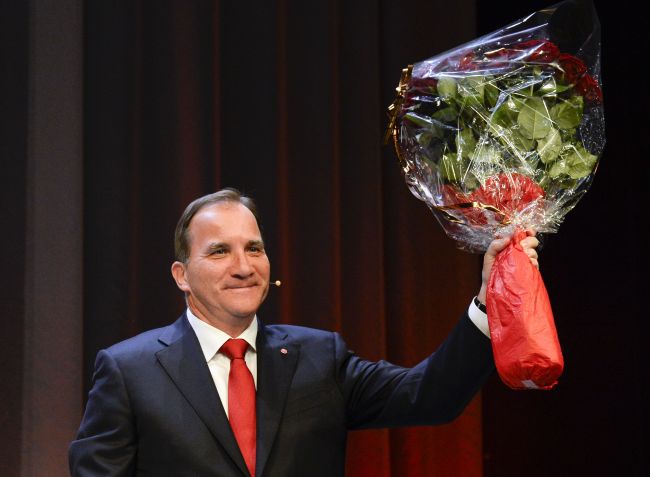STOCKHOLM (AFP) ― Sweden’s likely new prime minister, Social Democrat leader Stefan Loefven, may have little experience of national politics but this consensus-seeking trade unionist has overcome bigger obstacles before.
Put into an orphanage by his mother as an infant, he has had his critics in his short time as opposition leader. Yet others see the former welder as a man more in touch with “the real Sweden.”
“I have other relevant experience from working in industry and from leading a large trade union,” he told AFP just ahead of the vote.
“And I’m very proud of my background,” he added, referring to his working class roots.
Put into an orphanage by his mother as an infant, he has had his critics in his short time as opposition leader. Yet others see the former welder as a man more in touch with “the real Sweden.”
“I have other relevant experience from working in industry and from leading a large trade union,” he told AFP just ahead of the vote.
“And I’m very proud of my background,” he added, referring to his working class roots.

Despite the stocky 57-year-old’s lack of parliamentary experience, he may have what it takes to lead the Social Democratic Party ― which dominated the Nordic nation for most of the 20th century ― back to power after a painful eight years in opposition, observers said.
“He isn’t particularly charismatic,” Ulf Bjereld, a political science professor at Gothenburg University, told AFP. “But I think he radiates what people call ‘authenticity’ ― he is seen as reliable and honorable and that can create sympathy among voters who want more real politics and less political games.”
His unpolished side came to the fore in a TV debate last week when he crudely brushed away the outstretched hand of enterprise minister Annie Loeoef when she tried to give him a document on energy policy.
The clash drew a stinging rebuke from his conservative rival, Prime Minister Fredrik Reinfeldt, who said that’s how Social Democrat “strongmen behave.”
Ironically up until then it was Loefven’s cautious campaign that was getting him into trouble. One critic at trade union group LO told the political magazine Fokus that Loefven was “afraid of conflict,” while another described him as “a little cowardly, or perhaps he choose his battles carefully.”
After losing power for so long to Reinfeldt’s four-party conservative-liberal coalition, the Social Democrats may not have wanted to take unnecessary risks. “He’s done a big job of uniting and pulling together the party,” said professor Bjereld.
“That’s one of his strengths. He’s good at bringing people together and creating unity.”
His former colleague and successor at the IF Metall trade union, Anders Ferbe ― who remembers long evenings listening to Ulf Lundell, Sweden’s answer to Bob Dylan ― told AFP that Loefven was a consensus maker.
“That is the trade union tradition here ― to try and find a consensus,” he said. “That’s what he’s trained for all his life.”
Loefven was appointed Social Democrat leader in January 2012, tasked with repairing the damage done by the 2010 election defeat and the short-lived leadership of Haakan Juholt, whose media gaffes brought support to an all-time low.
Strongest when attacking the right’s record on social welfare and education, Loefven has been caught off guard by conservative adversaries who lampooned his policy differences with Green and Left Party allies on nuclear power and on profits in the welfare sector privatized by the right.
He has closely shadowed conservative policies, emulating the government’s vocabulary of “taking responsibility” for the economy, yet criticizing what he describes as the right’s destruction of Sweden’s welfare model.
Loefven was born in Stockholm but his single mother could not afford to keep him and after a short time at an orphanage he grew up in a foster home in the northern sawmill district of Aadalen, where his foster father was a factory worker.
“I had a really good upbringing up there, I didn’t suffer because of it,” he told Expressen newspaper.
When he met his wife Ulla she was already married with children, but she left her husband for Loefven.
Supporters point out that he is one of very few Swedish politicians to have had a “real job” ― having worked as a welder at an armaments factory for 16 years.
-
Articles by Korea Herald


















![[KH Explains] Hyundai's full hybrid edge to pay off amid slow transition to pure EVs](http://res.heraldm.com/phpwas/restmb_idxmake.php?idx=652&simg=/content/image/2024/04/18/20240418050645_0.jpg&u=20240418181020)

![[Today’s K-pop] Zico drops snippet of collaboration with Jennie](http://res.heraldm.com/phpwas/restmb_idxmake.php?idx=642&simg=/content/image/2024/04/18/20240418050702_0.jpg&u=)